Ecofeminism in Dialogue
Ecocritical Theory and Practice
Series Editor: Douglas A. Vakoch, METI
Advisory Board
Bruce Allen, Seisen University, Japan; Hannes Bergthaller, National Chung-Hsing University, Taiwan; Zlia Bora, Federal University of Paraba, Brazil; Izabel Brando, Federal University of Alagoas, Brazil; Byron Caminero-Santangelo, University of Kansas, USA; Simo Farias Almeida, Federal University of Roraima, Brazil; George Handley, Brigham Young University, USA; Isabel Hoving, Leiden University, The Netherlands; Idom Thomas Inyabri, University of Calabar, Nigeria; Serenella Iovino, University of Turin, Italy; Daniela Kato, Kyoto Institute of Technology, Japan; Petr Kopeck, University of Ostrava, Czech Republic; Serpil Oppermann, Hacettepe University, Turkey; Christian Schmitt-Kilb, University of Rostock, Germany; Heike Schwarz, University of Augsburg, Germany; Murali Sivaramakrishnan, Pondicherry University, India; Scott Slovic, University of Idaho, USA; J. Etienne Terblanche, North-West University, South Africa; Julia Tofantuk, Tallinn University, Estonia; Cheng Xiangzhan, Shandong University, China; Hubert Zapf, University of Augsburg, Germany
Ecocritical Theory and Practice highlights innovative scholarship at the interface of literary/cultural studies and the environment, seeking to foster an ongoing dialogue between academics and environmental activists.
Recent Titles
Ecofeminism in Dialogue, edited by Douglas A. Vakoch and Sam Mickey
The Image of the River in Latin/o American Literature , edited by Jeanie Murphy and Elizabeth G. Rivero
Seeing Animals after Derrida , edited by Sarah Bezan & James Tink
Eco Culture: Disaster, Narrative, Discourse , edited by Robert Bell and Robert Ficociello
Southeast Asian Ecocriticism: Theories, Practices, Prospects , edited by John Charles Ryan
Victorian Ecocriticism: The Politics of Place and Early Environmental Justice , edited by Dewey W. Hall
Bhopals Ecological Gothic: Disaster, Precarity and the Biopolitical Uncanny , by Pramod K. Nayar
Fallen Animals: Art, Religion, Literature , edited by Zohar Hadromi-Allouche
Ecological Thought in German Literature and Culture , edited by Gabriele Drbeck, Urte Stobbe, Hubert Zapf, and Evi Zemanek
The Horse in Literature and Film: Uncovering a Transcultural Paradigm , by Francisco LaRubia-Prado
Water in Medieval Literature: An Ecocritical Reading , by Albrecht Classen
Sustainability and the City: Urban Poetics and Politics , edited by Lauren Curtright and Doris Bremm
Ecofeminism in Dialogue , edited by Douglas A. Vakoch and Sam Mickey
Ecofeminism in Dialogue
Edited by
Douglas A. Vakoch and Sam Mickey
LEXINGTON BOOKS
Lanham Boulder New York London
Published by Lexington Books
An imprint of The Rowman & Littlefield Publishing Group, Inc.
4501 Forbes Boulevard, Suite 200, Lanham, Maryland 20706
www.rowman.com
Unit A, Whitacre Mews, 26-34 Stannary Street, London SE11 4AB
Copyright 2018 by Lexington Books
Chapter 12: From Ecological Borderlands . Copyright 2016 by the Board of Trustees of the University of Illinois. Used with permission of the University of Illinois Press.
All rights reserved . No part of this book may be reproduced in any form or by any electronic or mechanical means, including information storage and retrieval systems, without written permission from the publisher, except by a reviewer who may quote passages in a review.
British Library Cataloguing in Publication Information Available
Library of Congress Cataloging-in-Publication Data Available
ISBN 978-1-4985-6927-9 (cloth : alk. paper)
ISBN 978-1-4985-6928-6 (electronic)
 The paper used in this publication meets the minimum requirements of American National Standard for Information SciencesPermanence of Paper for Printed Library Materials, ANSI/NISO Z39.48-1992.
The paper used in this publication meets the minimum requirements of American National Standard for Information SciencesPermanence of Paper for Printed Library Materials, ANSI/NISO Z39.48-1992.
Printed in the United States of America
Contents
Sam Mickey
Valerie Padilla Carroll
Anna Bedford
Benay Blend
Michelle Deininger
Karen Ya-Chu Yang
Edna Gorney
Gail Grossman Freyne
Tina Sikka
Ann Hidalgo
Rachel Hart Winter
Rebecca Meier-Rao
Jessica McLean
Christina Holmes
Kate Wilkinson Cross
Several people came together in different kinds of dialogue to make this book happen. As the editors of this book, we first and foremost want to express our gratitude to each of the contributors: Anna Bedford, Benay Blend, Michelle Deininger, Gail Grossman Freyne, Edna Gorney, Rachel Hart Winter, Ann Hidalgo, Christina Holmes, Jess McLean, Rebecca Meier-Rao, Valerie Padilla Carroll, Tina Sikka, Kate Wilkinson Cross, and Karen Ya-Chu Yang. We want to thank Lindsey Porambo and everyone at Lexington Books who helped usher this book through the publication process.
Doug Vakoch is grateful to the members of METIs Board of Directors for their friendship and creative collaboration. It is rare to find a community that sees a natural link between sustainability and the search for life in the universe, as reflected in a strategic plan that affirms the ways that ecofeminism can provide insights into fostering environmental sustainability on multigenerational timescales. Doug especially thanks Harry and Joyce Letaw for their ongoing intellectual and financial contributions to METI. For creating new publishing opportunities for scholars working at the interface of literature and environment, he thanks the members of the Advisory Board of Lexington Books Ecocritical Theory and Practice Series. Finally, to his wife Julie Bayless, Doug is grateful in more ways than he can or will share here.
Sam Mickey would like to extend specific acknowledgments to all of the personal and professional support he received while working on this project, including friends, family, students, colleagues, and online interlocutors. Special thanks are owed to the University of San Francisco, where Sam teaches in the Theology and Religious Studies department and Environmental Studies program. The learning community at USF provides a very hospitable context for developing thoughtful, engaged perspectives on the intersections of feminist and ecological concerns. Sam would also like to express gratitude to Mary Evelyn Tucker, John Grim, and everyone at the Forum on Religion and Ecology at Yale. The Forum inspires exactly the kind of dialogue that this anthology seeks to articulate. Sam would also like to thank Kimberly Carfore for sharing her love, support, and ecofeminist acumen.
Finally, last but certainly not least, we must acknowledge all of the nonhuman inhabitants and habitats of Earth, without which this book would neither be relevant nor possible. Full of gratitude for all of our relations, this book is dedicated to the cultivation of a more peaceful, just, and sustainable community of life on Earth.
Sam Mickey
The very idea of ecofeminism implies communication across differences. In other words, ecofeminism is always already in dialogue. Ecofeminism emerged in the 1970s through dialogue across ecological and feminist perspectives, with people searching for ways of understanding how ecological matters of concern involving natural systems intersect with feminist matters of concern, such as the rights and flourishing of women. That dialogue remains ongoing today, and in the meantime, it has made possible nearly half a century of ecofeminism both as an academic field of study and an area of engagement for activism and advocacy.
Ecofeminists interrogate the historical, conceptual, and experiential ways in which sex and gender connect with nature, matter, life, and embodiment. Those connections are exceedingly complex, so finding total agreement among every ecofeminist is impossible, not to mention that the lack of differing perspectives would be relatively boring. Accordingly, there is more than one way to go about ecofeminist analysis, and there is more than one conclusion that can be reached. Although the word ecofeminism is a singular noun, it refers not to a monolithic or homogeneous ecofeminism but to a plurality of ecofeminisms. It refers to a multiplicity of theories, methods, and practices for interpreting and transforming relationships between the bodies that share this same planetary home, Earth, including the gendered and sexually differentiated bodies of humans as well as the nonhuman bodies of other organisms and environments. Furthermore, the plurality of ecofeminisms is also in dialogue with arts, sciences, religions, other movements and fields engaged with gender and sexuality, which continue to multiply and diversify in many ways (e.g., womanism, cyberfeminism, xenofeminism, transfeminism, queer theory, and new materialist feminism). Whether they are friendly alliances, highly contentious and polarizing disagreements, or something in between, those various kinds of dialogue are indicative of how ecofeminism is constituted in dialogical relationships, communicating among and beyond a plurality of different ecofeminist perspectives.

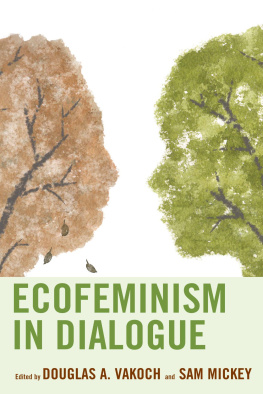

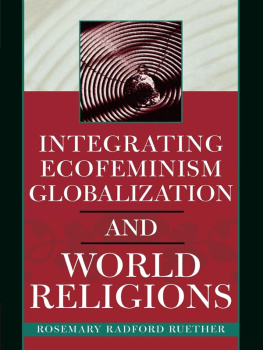
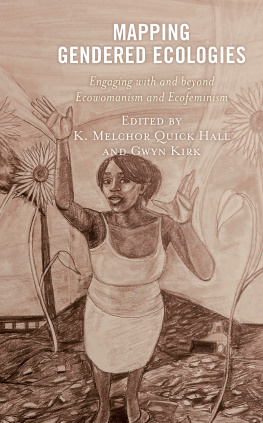
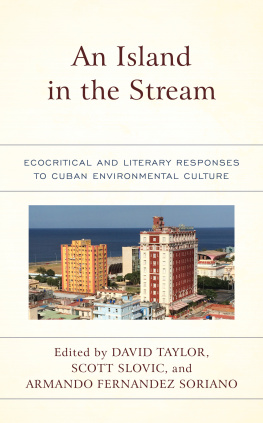
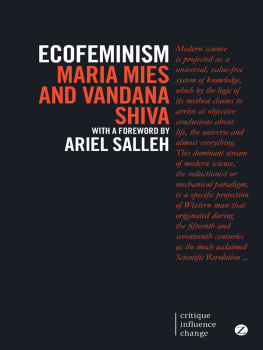
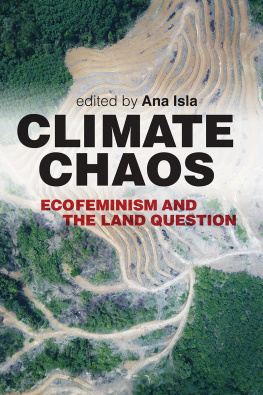

 The paper used in this publication meets the minimum requirements of American National Standard for Information SciencesPermanence of Paper for Printed Library Materials, ANSI/NISO Z39.48-1992.
The paper used in this publication meets the minimum requirements of American National Standard for Information SciencesPermanence of Paper for Printed Library Materials, ANSI/NISO Z39.48-1992.